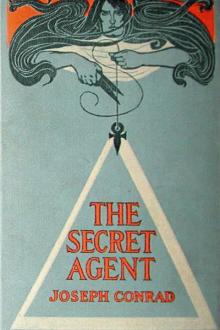The Secret Agent: A Simple Tale, Joseph Conrad [i can read book club .txt] 📗

- Author: Joseph Conrad
Book online «The Secret Agent: A Simple Tale, Joseph Conrad [i can read book club .txt] 📗». Author Joseph Conrad
Near him, her black form merged in the night, like a figure half chiselled out of a block of black stone. It was impossible to say what she knew, how deep she was involved with policemen and Embassies. But if she wanted to get away, it was not for him to object. He was anxious to be off himself. He felt that the business, the shop so strangely familiar to chief inspectors and members of foreign Embassies, was not the place for him. That must be dropped. But there was the rest. These savings. The money!
“You must hide me till the morning somewhere,” she said in a dismayed voice.
“Fact is, my dear, I can’t take you where I live. I share the room with a friend.”
He was somewhat dismayed himself. In the morning the blessed ’tecs will be out in all the stations, no doubt. And if they once got hold of her, for one reason or another she would be lost to him indeed.
“But you must. Don’t you care for me at all—at all? What are you thinking of?”
She said this violently, but she let her clasped hands fall in discouragement. There was a silence, while the mist fell, and darkness reigned undisturbed over Brett Place. Not a soul, not even the vagabond, lawless, and amorous soul of a cat, came near the man and the woman facing each other.
“It would be possible perhaps to find a safe lodging somewhere,” Ossipon spoke at last. “But the truth is, my dear, I have not enough money to go and try with—only a few pence. We revolutionists are not rich.”
He had fifteen shillings in his pocket. He added:
“And there’s the journey before us, too—first thing in the morning at that.”
She did not move, made no sound, and Comrade Ossipon’s heart sank a little. Apparently she had no suggestion to offer. Suddenly she clutched at her breast, as if she had felt a sharp pain there.
“But I have,” she gasped. “I have the money. I have enough money. Tom! Let us go from here.”
“How much have you got?” he inquired, without stirring to her tug; for he was a cautious man.
“I have the money, I tell you. All the money.”
“What do you mean by it? All the money there was in the bank, or what?” he asked incredulously, but ready not to be surprised at anything in the way of luck.
“Yes, yes!” she said nervously. “All there was. I’ve it all.”
“How on earth did you manage to get hold of it already?” he marvelled.
“He gave it to me,” she murmured, suddenly subdued and trembling. Comrade Ossipon put down his rising surprise with a firm hand.
“Why, then—we are saved,” he uttered slowly.
She leaned forward, and sank against his breast. He welcomed her there. She had all the money. Her hat was in the way of very marked effusion; her veil too. He was adequate in his manifestations, but no more. She received them without resistance and without abandonment, passively, as if only half-sensible. She freed herself from his lax embraces without difficulty.
“You will save me, Tom,” she broke out, recoiling, but still keeping her hold on him by the two lapels of his damp coat. “Save me. Hide me. Don’t let them have me. You must kill me first. I couldn’t do it myself—I couldn’t, I couldn’t—not even for what I am afraid of.”
She was confoundedly bizarre, he thought. She was beginning to inspire him with an indefinite uneasiness. He said surlily, for he was busy with important thoughts:
“What the devil are you afraid of?”
“Haven’t you guessed what I was driven to do!” cried the woman. Distracted by the vividness of her dreadful apprehensions, her head ringing with forceful words, that kept the horror of her position before her mind, she had imagined her incoherence to be clearness itself. She had no conscience of how little she had audibly said in the disjointed phrases completed only in her thought. She had felt the relief of a full confession, and she gave a special meaning to every sentence spoken by Comrade Ossipon, whose knowledge did not in the least resemble her own. “Haven’t you guessed what I was driven to do!” Her voice fell. “You needn’t be long in guessing then what I am afraid of,” she continued, in a bitter and sombre murmur. “I won’t have it. I won’t. I won’t. I won’t. You must promise to kill me first!” She shook the lapels of his coat. “It must never be!”
He assured her curtly that no promises on his part were necessary, but he took good care not to contradict her in set terms, because he had had much to do with excited women, and he was inclined in general to let his experience guide his conduct in preference to applying his sagacity to each special case. His sagacity in this case was busy in other directions. Women’s words fell into water, but the shortcomings of time-tables remained. The insular nature of Great Britain obtruded itself upon his notice in an odious form. “Might just as well be put under lock and key every night,” he thought irritably, as nonplussed as though he had a wall to scale with the woman on his back. Suddenly he slapped his forehead. He had by dint of cudgelling his brains just thought of the Southampton—St Malo service. The boat left about midnight. There was a train at 10.30. He became cheery and ready to act.
“From Waterloo. Plenty of time. We are all right after all. . . . What’s the matter now? This isn’t the way,” he protested.
Mrs Verloc, having hooked her arm into his, was trying to drag him into Brett Street again.
“I’ve forgotten to shut the shop door as I went out,” she whispered, terribly agitated.
The shop and all that was in it had ceased to interest Comrade Ossipon. He knew how to limit his desires. He was on the point of saying “What of that? Let it be,” but he refrained. He disliked argument about trifles. He even mended his pace considerably on the thought that she might have left the money in the drawer. But his willingness lagged behind her feverish impatience.
The shop seemed to be quite dark at first. The door stood ajar. Mrs Verloc, leaning against the front, gasped out:
“Nobody has been in. Look! The light—the light in the parlour.”
Ossipon, stretching his head forward, saw a faint gleam in the darkness of the shop.
“There is,” he said.
“I forgot it.” Mrs Verloc’s voice came from behind her veil faintly. And as he stood waiting for her to enter first, she said louder: “Go in and put it out—or I’ll go mad.”
He made no immediate objection to this proposal, so strangely motived. “Where’s all that money?” he asked.
“On me! Go, Tom. Quick! Put it out. . . . Go in!” she cried, seizing him by both shoulders from behind.
Not prepared for a display of physical force, Comrade Ossipon stumbled far into the shop before her push. He was astonished at the strength of the woman and scandalised by her proceedings. But he did not retrace his steps in order to remonstrate with her severely in the street. He was beginning to be disagreeably impressed by her fantastic behaviour. Moreover, this or never was the time to humour the woman. Comrade Ossipon avoided easily the end of the counter, and approached calmly the glazed door of the parlour. The curtain over the panes being drawn back a little he, by a very natural impulse, looked in, just as he made ready to turn the handle. He looked in without a thought, without intention, without curiosity of any sort. He looked in because he could not help looking in. He looked in, and discovered Mr Verloc reposing quietly on the sofa.
A yell coming from the innermost depths of his chest died out unheard and transformed into a sort of greasy, sickly taste on his lips. At the same time the mental personality of Comrade Ossipon executed a frantic leap backward. But his body, left thus without intellectual guidance, held on to the door handle with the unthinking force of an instinct. The robust anarchist did not even totter. And he stared, his face close to the glass, his eyes protruding out of his head. He would have given anything to get away, but his returning reason informed him that it would not do to let go the door handle. What was it—madness, a nightmare, or a trap into which he had been decoyed with fiendish artfulness? Why—what for? He did not know. Without any sense of guilt in his breast, in the full peace of his conscience as far as these people were concerned, the idea that he would be murdered for mysterious reasons by the couple Verloc passed not so much across his mind as across the pit of his stomach, and went out, leaving behind a trail of sickly faintness—an indisposition. Comrade Ossipon did not feel very well in a very special way for a moment—a long moment. And he stared. Mr Verloc lay very still meanwhile, simulating sleep for reasons of his own, while that savage woman of his was guarding the door—invisible and silent in the dark and deserted street. Was all this a some sort of terrifying arrangement invented by the police for his especial benefit? His modesty shrank from that explanation.
But the true sense of the scene he was beholding came to Ossipon through the contemplation of the hat. It seemed an extraordinary thing, an ominous object, a sign. Black, and rim upward, it lay on the floor before the couch as if prepared to receive the contributions of pence from people who would come presently to behold Mr Verloc in the fullness of his domestic ease reposing on a sofa. From the hat the eyes of the robust anarchist wandered to the displaced table, gazed at the broken dish for a time, received a kind of optical shock from observing a white gleam under the imperfectly closed eyelids of the man on the couch. Mr Verloc did not seem so much asleep now as lying down with a bent head and looking insistently at his left breast. And when Comrade Ossipon had made out the handle of the knife he turned away from the glazed door, and retched violently.
The crash of the street door flung to made his very soul leap in a panic. This house with its harmless tenant could still be made a trap of—a trap of a terrible kind. Comrade Ossipon had no settled conception now of what was happening to him. Catching his thigh against the end of the counter, he spun round, staggered with a cry of pain, felt in the distracting clatter of the bell his arms pinned to his side by a convulsive hug, while the cold lips of a woman moved creepily on his very ear to form the words:
“Policeman! He has seen me!”
He ceased to struggle; she never let him go. Her hands had locked themselves with an inseparable twist of fingers on his robust back. While the footsteps approached, they breathed quickly, breast to breast, with hard, laboured breaths, as if theirs had been the attitude of a deadly struggle, while, in fact, it was the attitude of deadly fear. And the time was long.
The constable on the beat had in truth seen something of Mrs Verloc; only coming from the lighted thoroughfare at the other end of Brett Street, she had been no more to him than a flutter in the darkness. And he was not even quite sure that there had been a flutter. He had no reason to hurry up. On coming abreast of the shop he observed that it had been closed early. There was nothing very unusual in that. The men on duty had special instructions about that shop: what went on about there was not to be meddled with unless absolutely disorderly, but any observations made were to be reported. There were no observations to make; but from a sense of duty and for the peace of his conscience, owing also to that doubtful flutter of the darkness, the constable crossed the road, and tried the door. The spring latch, whose key was reposing for ever off duty in the late Mr Verloc’s waistcoat pocket, held as well as usual. While the conscientious officer was shaking the handle, Ossipon felt the cold lips of the woman stirring again creepily against his very ear:
“If he comes in kill me—kill me, Tom.”
The constable moved away, flashing as he passed the light of his dark lantern, merely for form’s sake, at the shop window. For a moment longer the man and the woman inside stood motionless, panting, breast to breast; then her fingers came unlocked, her arms fell by her side slowly.





Comments (0)